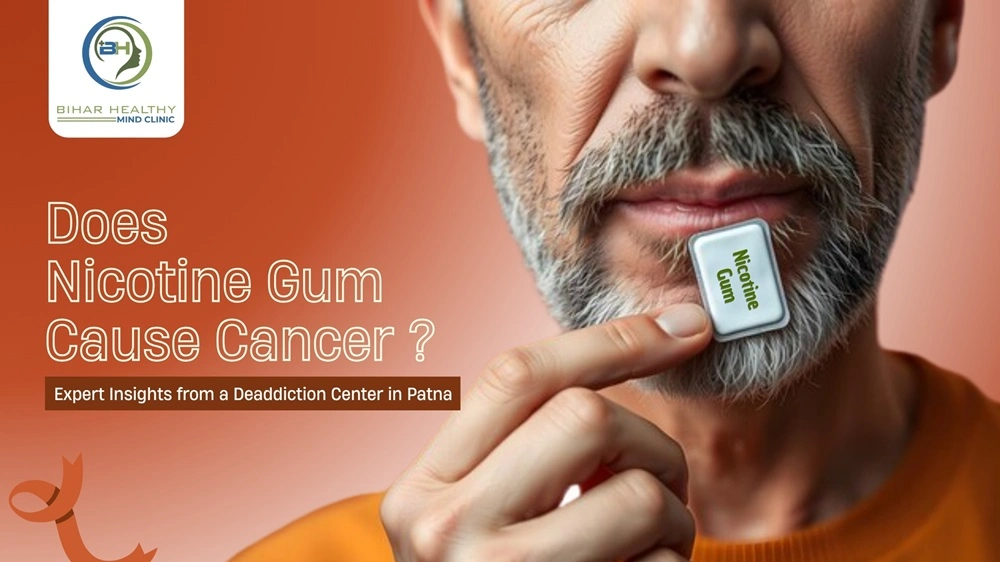
For decades, nicotine has been identified as a primary component of tobacco use, contributing to various related health problems. While smoking and other tobacco products are recognized for their cancer-causing risks, many people still question: can nicotine gum cause cancer? This question is especially relevant for those trying to quit smoking using nicotine replacement therapies (NRTs).
In this blog, we’ll explore the scientific understanding of nicotine, whether it can cause cancer on its own, and how long-term nicotine exposure can affect the brain and body. This article also includes expert opinions from Patna Psychiatry, one of the top deaddiction centers in Patna, led by Dr. Saurabh Kumar, MD (Psychiatry), respected as the best psychiatrist in Patna.
Understanding Nicotine: What It Really Does
Nicotine is a naturally occurring compound present in the leaves of the tobacco plant. It acts as a stimulant, rapidly reaching the brain and triggering the release of neurotransmitters like dopamine, the “feel-good” chemical. This response makes nicotine highly addictive.
However, major international health agencies, including the World Health Organization (WHO) and the Centers for Disease Control and Prevention (CDC), do not categorize nicotine itself as a cancer-causing substance. The primary culprits for cancer in smoking are the tar, formaldehyde, benzene, and other toxic chemicals found in tobacco smoke, not nicotine alone.
That said, nicotine isn’t harmless. It can negatively affect cardiovascular health, brain development, and mental well-being, especially when used long-term or in high doses.
Does Nicotine Gum Cause Cancer?
Nicotine gums and patches are widely used as part of nicotine replacement therapy (NRT) to help people quit smoking. These products deliver controlled doses of nicotine without exposing users to the harmful chemicals found in cigarette smoke.
So, does nicotine gum cause cancer?
Studies so far indicate that nicotine gum is not directly linked to the development of cancer. However, prolonged use of nicotine products, even in safer forms, may increase the risk of other health issues:
- Cellular Changes: Nicotine can promote cell proliferation and inhibit cell death (apoptosis), potentially creating an environment where cancer could develop if other risk factors exist.
- DNA Damage: Some animal studies suggest that nicotine might contribute to DNA damage indirectly, though human evidence remains limited.
- Vascular and Heart Risks: Nicotine raises heart rate and blood pressure, increasing cardiovascular strain.
- Addiction Risk: Continued use of nicotine gum can lead to dependency, making it difficult to achieve full recovery from addiction.
Hence, although nicotine gum is considerably safer compared to smoking, it still carries certain health risks and should be used responsibly. It’s best used under medical supervision, especially at a professional deaddiction center in Patna like Patna Psychiatry.
Nicotine and Mental Health: The Hidden Connection
From a psychiatric perspective, nicotine addiction is not just a physical dependence, it’s a psychological and behavioral disorder. Many individuals smoke or use nicotine to cope with stress, anxiety, or depression.
Over time, nicotine alters brain chemistry, leading to mood fluctuations and increased dependency. This explains why quitting nicotine can cause irritability, restlessness, and even depression, symptoms that can be managed through behavioral therapy and medical deaddiction programs.
At Patna Psychiatry, Dr. Saurabh Kumar and his team focus on both the biological and psychological aspects of nicotine addiction. This dual approach ensures not only physical recovery but also long-term emotional stability.
Nicotine Gum: Safe Use Guidelines
Nicotine gums can be beneficial for smokers looking to quit, but proper use is crucial. Here are expert tips from psychiatric and deaddiction professionals:
- Use as a Transition Tool: Nicotine gum should be a short-term aid, not a permanent substitute for cigarettes.
- Follow Dosage Instructions: Overuse can lead to nicotine overdose symptoms like nausea, dizziness, or rapid heartbeat.
- Avoid Dual Use: Using nicotine gum while still smoking defeats the purpose and increases health risks.
- Seek Supervised Help: Consulting the best psychiatrist in Patna or a qualified deaddiction specialist ensures safe and effective cessation planning.
How a Deaddiction Center in Patna Can Help
Nicotine addiction can be just as difficult to overcome as drug or alcohol dependency. That’s why comprehensive care from a professional deaddiction center in Patna can make all the difference.
At Patna Psychiatry, the focus is on personalized, evidence-based treatment that addresses both the physical addiction and the emotional triggers behind it.
-
Treatments may include:
- Nicotine replacement therapy (NRT) management
- Cognitive Behavioral Therapy (CBT)
- Motivational enhancement therapy
- Lifestyle counseling and stress management
- Group therapy and relapse prevention sessions
This holistic approach has helped countless individuals regain control of their health and mind, moving toward a nicotine-free life.
Key Takeaway: Can Nicotine Alone Cause Cancer?
While nicotine itself is not directly carcinogenic, its role in promoting cell growth and sustaining addiction cannot be ignored. The main risk lies in how long and how much nicotine one consumes. Prolonged dependency can indirectly contribute to diseases, mental distress, and other complications.
Therefore, if you’re struggling with nicotine dependence, whether through smoking, vaping, or gum use, it’s important to seek help from professionals. The team at Patna Psychiatry, led by Dr. Saurabh Kumar (MD Psychiatry), offers compassionate and scientifically guided treatment at one of the most trusted deaddiction centers in Patna.
Breaking free from nicotine is not just about willpower, it’s about understanding the brain’s chemistry and healing it systematically.
Conclusion
In summary, nicotine alone does not directly cause cancer, but it isn’t completely safe either. Nicotine gums can be helpful tools for quitting smoking, but they should be used responsibly under professional guidance.
If you or someone you know is struggling with nicotine addiction, reach out to Patna Psychiatry, where medical expertise and compassionate care meet. With the guidance of the best psychiatrist in Patna, you can take confident steps toward a healthier, nicotine-free life.
Visitors: 38





No comments yet.